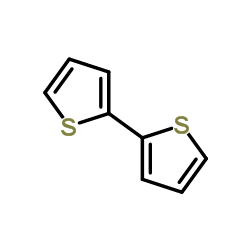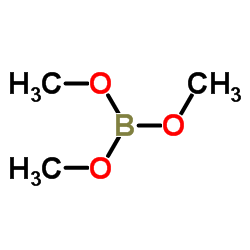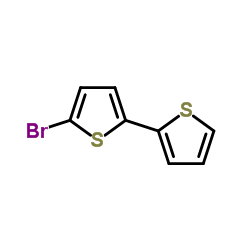132898-95-4
| Name | 2,2-Bithiophene-5-boronic acid |
|---|---|
| Synonyms |
(5-thiophen-2-ylthiophen-2-yl)boronic acid
[2,2'-Bithiophen]-5-ylboronic acid |
| Density | 1.42g/cm3 |
|---|---|
| Boiling Point | 416.1ºC at 760mmHg |
| Melting Point | 127ºC |
| Molecular Formula | C8H7BO2S2 |
| Molecular Weight | 210.08100 |
| Flash Point | 205.5ºC |
| Exact Mass | 209.99800 |
| PSA | 96.94000 |
| LogP | 1.15640 |
| Vapour Pressure | 1.14E-07mmHg at 25°C |
| Index of Refraction | 1.658 |
Synonym: Section 2 - COMPOSITION, INFORMATION ON INGREDIENTS
Risk Phrases: 36/37/38 Section 3 - HAZARDS IDENTIFICATION EMERGENCY OVERVIEW
Irritating to eyes, respiratory system and skin.Moisture sensitive. Potential Health Effects Eye: Causes eye irritation. Skin: Causes skin irritation. May be harmful if absorbed through the skin. Ingestion: May cause irritation of the digestive tract. May be harmful if swallowed. Inhalation: Causes respiratory tract irritation. May be harmful if inhaled. Chronic: Not available. Section 4 - FIRST AID MEASURES Eyes: Flush eyes with plenty of water for at least 15 minutes, occasionally lifting the upper and lower eyelids. Get medical aid. Skin: Get medical aid. Flush skin with plenty of water for at least 15 minutes while removing contaminated clothing and shoes. Ingestion: Get medical aid. Wash mouth out with water. Inhalation: Remove from exposure and move to fresh air immediately. If not breathing, give artificial respiration. If breathing is difficult, give oxygen. Get medical aid. Notes to Physician: Treat symptomatically and supportively. Section 5 - FIRE FIGHTING MEASURES General Information: As in any fire, wear a self-contained breathing apparatus in pressure-demand, MSHA/NIOSH (approved or equivalent), and full protective gear. Extinguishing Media: Use foam, dry chemical, or carbon dioxide. Section 6 - ACCIDENTAL RELEASE MEASURES General Information: Use proper personal protective equipment as indicated in Section 8. Spills/Leaks: Vacuum or sweep up material and place into a suitable disposal container. Section 7 - HANDLING and STORAGE Handling: Avoid breathing dust, vapor, mist, or gas. Avoid contact with skin and eyes. Storage: Store in a cool, dry place. Store in a tightly closed container. Store under nitrogen. Section 8 - EXPOSURE CONTROLS, PERSONAL PROTECTION Engineering Controls: Facilities storing or utilizing this material should be equipped with an eyewash facility and a safety shower. Use adequate ventilation to keep airborne concentrations low. Exposure Limits CAS# 132898-95-4: Personal Protective Equipment Eyes: Not available. Skin: Wear appropriate protective gloves to prevent skin exposure. Clothing: Wear appropriate protective clothing to prevent skin exposure. Respirators: Follow the OSHA respirator regulations found in 29 CFR 1910.134 or European Standard EN 149. Use a NIOSH/MSHA or European Standard EN 149 approved respirator if exposure limits are exceeded or if irritation or other symptoms are experienced. Section 9 - PHYSICAL AND CHEMICAL PROPERTIES Physical State: Solid Color: blue Odor: Not available. pH: Not available. Vapor Pressure: Not available. Viscosity: Not available. Boiling Point: Not available. Freezing/Melting Point: 127 deg C Autoignition Temperature: Not available. Flash Point: Not available. Explosion Limits, lower: Not available. Explosion Limits, upper: Not available. Decomposition Temperature: Solubility in water: Specific Gravity/Density: Molecular Formula: C8H7BO2S2 Molecular Weight: 210.08 Section 10 - STABILITY AND REACTIVITY Chemical Stability: Not available. Conditions to Avoid: Incompatible materials, exposure to moist air or water. Incompatibilities with Other Materials: Strong oxidizing agents, bases, reducing agents, halogens, halogenated agents. Hazardous Decomposition Products: Carbon monoxide, oxides of sulfur, carbon dioxide, acrid smoke and fumes, oxides of boron. Hazardous Polymerization: Has not been reported Section 11 - TOXICOLOGICAL INFORMATION RTECS#: CAS# 132898-95-4 unlisted. LD50/LC50: Not available. Carcinogenicity: 2,2'-Bithiophene-5-boronic acid - Not listed by ACGIH, IARC, or NTP. Section 12 - ECOLOGICAL INFORMATION Section 13 - DISPOSAL CONSIDERATIONS Dispose of in a manner consistent with federal, state, and local regulations. Section 14 - TRANSPORT INFORMATION IATA No information available. IMO No information available. RID/ADR No information available. Section 15 - REGULATORY INFORMATION European/International Regulations European Labeling in Accordance with EC Directives Hazard Symbols: XI Risk Phrases: R 36/37/38 Irritating to eyes, respiratory system and skin. Safety Phrases: S 26 In case of contact with eyes, rinse immediately with plenty of water and seek medical advice. S 37/39 Wear suitable gloves and eye/face protection. WGK (Water Danger/Protection) CAS# 132898-95-4: No information available. Canada None of the chemicals in this product are listed on the DSL/NDSL list. CAS# 132898-95-4 is not listed on Canada's Ingredient Disclosure List. US FEDERAL TSCA CAS# 132898-95-4 is not listed on the TSCA inventory. It is for research and development use only. SECTION 16 - ADDITIONAL INFORMATION N/A |
| Hazard Codes | Xi |
|---|---|
| Risk Phrases | R36/37/38 |
| Safety Phrases | S26-S37/39 |
|
~72% 
132898-95-4 |
| Literature: Kim, Dae-Sik; Kyo, Han Ahn Journal of Organic Chemistry, 2008 , vol. 73, # 17 p. 6831 - 6834 |
|
~71% 
132898-95-4 |
| Literature: Toyo Gosei Co., Ltd. Patent: EP1535942 A1, 2005 ; |
|
~98% 
132898-95-4 |
| Literature: Katagiri, Toshifumi; Ota, Satoshi; Ohira, Takayuki; Yamao, Takeshi; Hotta, Shu Journal of Heterocyclic Chemistry, 2007 , vol. 44, # 4 p. 853 - 862 |
|
~78% 
132898-95-4 |
| Literature: Dufresne, Stephane; Hanan, Garry S.; Skene Journal of Physical Chemistry B, 2007 , vol. 111, # 39 p. 11407 - 11418 |
|
~73% 
132898-95-4 |
| Literature: An, Peng; Yu, Zhipeng; Lin, Qing Chemical Communications, 2013 , vol. 49, # 85 p. 9920 - 9922 |




